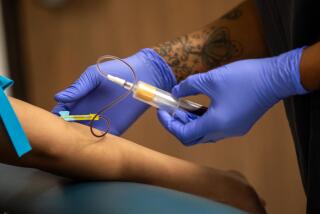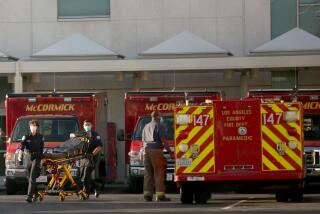Center Will Test for AIDS-Related Virus
- Share via
A state-mandated program to test for the AIDS-related antibody HTLV-III will be launched at the Gay and Lesbian Community Services Center in September, but local health officials say that only a fraction of the county’s high-risk residents are expected to seek out the service.
The Hollywood center was selected by the county as a key site for detecting the antibody, whose presence indicates past exposure to the HTLV-III virus, which has been linked to acquired immune deficiency syndrome, or AIDS.
Although the antibody has been detected in AIDS victims, medical experts do not know whether its presence in healthy individuals means they will get AIDS.
County officials said they selected the center in part because it is located near West Hollywood’s large gay population. Homosexual men, intravenous drug users and hemophiliacs or people requiring many blood transfusions are considered high-risk groups for contracting AIDS.
Two test centers opened in Long Beach in late June, one run by the city’s health department and another operated by The Center, a local gay and lesbian community center. Kate McKey, a city epidemiologist, said about 800 people have been tested, “and we saw a tremendous rise in numbers after Rock Hudson was diagnosed with AIDS.”
Dr. Martin Finn, medical director of the county’s public health programs, said the state has mandated that counties with blood banks set up separate test sites for the antibody in order to protect blood banks from possible AIDS contamination. Confidential testing will be available to anyone wishing it, state officials said.
Finn said the Legislature approved the test-site program because it was feared that high-risk individuals worried about AIDS would donate blood “simply to be tested for the HTLV-III antibody.” The test is conducted on all blood donated in blood banks, and blood containing the antibody is destroyed.
“We don’t want anybody using the blood-donating system as a way to test for HTLV-III,” Finn said, noting that infected individuals might not yet have indications of the antibody in their system, but could still pass the HTLV-III virus along in their blood.
“So far our reports from the blood banks and American Red Cross indicate that has not been a problem in this county,” he said.
Finn and Robert Gates, director of the county Department of Health Services, predicted that only a fraction of the county’s estimated 450,000 high-risk residents would approach the center for testing.
Both cited the efforts of county health officials and some gay leaders who have publicly discouraged homosexuals and other high-risk populations from being tested. Finn and others contend that the tests can cause undue fear in those who test positive, and a false sense of security in those who test negative.
Their view has been challenged by some gay leaders and medical experts, who contend that people should find out as much as possible about whether they are at risk for contracting or spreading AIDS.
Robert McLane, a psychosocial worker for AIDS Project Los Angeles, said his organization has taken no policy stand on the debate but has some advice for those thinking of taking the test.
‘Ask Some Questions’
“We want people to ask some questions before they take the test . . . such as how will the results help you, and what will you do if they are positive? The difficulty in the past is that people who have tested positive freaked out about it, and this kind of hysteria is something we want to avoid. We feel it’s really up to the individual.”
But the county’s Finn said he feels people should not take the test “unless they have a very great need.” For example, he said, a surgery patient who received many transfusions and fears possible exposure to AIDS might want to take the test to allay his anxiety.
“What we are concerned about is that individuals who test positive may go off the deep end . . . or those who are very (sexually) active but test negative may say, ‘Well, I can do anything I want--I don’t have it,” Finn said.
Finn noted that the antibody’s presence has not been proved to cause AIDS. “If they test positive on the antibody it doesn’t mean that much to them--it doesn’t mean they can communicate AIDS or even that they can get AIDS,” he said.
Gates predicted that only about 12,000 county residents would approach the center for testing, and only about 9,000 would ultimately agree to be tested.
However, Bob Hirsch, field representative for the state Department of Health Services AIDS section, said the state takes a different view.
“We know what Los Angeles County is (advising), but the state’s position is to be completely neutral on testing,” Hirsch said. “We do not tell people we think they should or should not get the test. We believe this is strictly an individual judgment.”
Hirsch said state health officials “are extremely happy with the validity of the test now that we’ve put it to use on a large scale. We feel the test is an excellent measure for whether you have the antibody or not.”
According to Hirsch, other counties that have opened testing centers have experienced a steady increase in people seeking out the test.
He said that since June, when many counties opened separate testing centers for HTLV-III, 4,612 people have been tested. Only 220 individuals were tested statewide in June, but in July 1,450 were tested, and in August about 3,200 are expected to be tested, he said.
While some of the increase came from counties that opened test centers later than others, Hirsch said, part was the result of increasing demand from people who are concerned about AIDS.
McKey, the Long Beach health official, said results of the Long Beach tests were not immediately available. However, county officials have estimated that about 40% of those who are tested will have positive test results for the antibody.
Finn said that regardless of whether an individual chooses to take the test, “we are telling people to lead their lives as if they have tested positive for HTLV-III.”
“If you are a very active homosexual you should know your sexual partners and try to shoot for monogamy if you can,” Finn said.
“We’re saying that to the heterosexuals too. This isn’t a time for a lot of sexual activity.”
Officials said blood donated at blood banks will still be tested and destroyed if found to contain the antibody.
More to Read
Sign up for Essential California
The most important California stories and recommendations in your inbox every morning.
You may occasionally receive promotional content from the Los Angeles Times.










